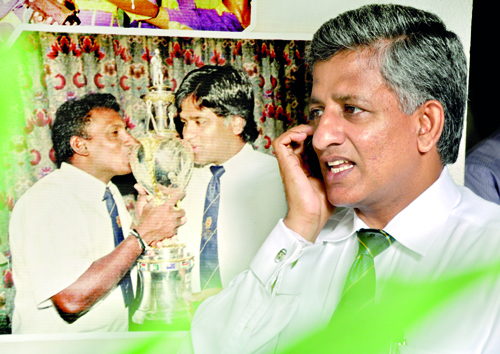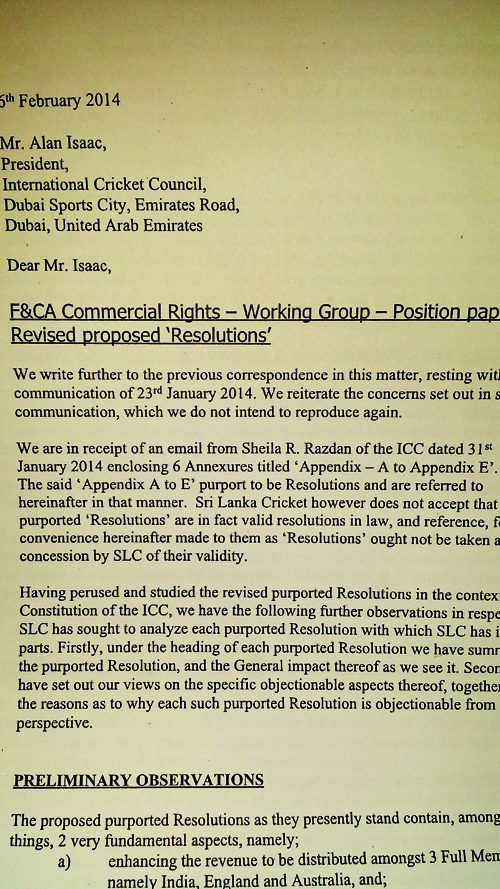You cannot serve cricket and mammon
By the time you read this column, in all probabilities the membership of the International Cricket Council would have used their vote for or against the ‘Out of the blues Working Paper’ presented by India, England and Australia in a bid to gain total control of the game of cricket, perhaps, forever.
Now whatever the final outcome is, the game of cricket wouldn’t be the same again. If the Big Three have fallen at the post in their bid, they would keep sulking and would be planning on how to get even with South Africa, Pakistan and Sri Lanka who almost play equally good cricket or sometimes better cricket than India, England and Australia.
Now the cricketing world would be in three factions. One would be ‘the Big Three’ who would be conspiring to punish the three rebels even if they have won or lost. The second group would be the three rebels who stood by their guns to fight the coming apartheid. Now they would have to keep fighting against the minus waves that would be created by their foes. Then come the worms, who turned for short-term gains; they may back the Big Three’s vengeance or their manipulations of the future tours programme.

SLC Secretary Nishantha Ranatunga told the Sunday Times about what transpired during this period - File pic
At the world forum it is only Australia which have constantly maintained a high profile in their standard of cricket while the standards of Indian and English cricket have fluctuated like any other Test playing nation. Then especially how could India and England take a major share of the pie?
The ‘Big Three’ said that the changes were mooted because of the revenue that they bring in to the ICC coffers. But, they should have remembered that at all ICC events it is a forum of cricketers across the boardwalk that performs. Even the IPL is strong because it draws a plethora of cricketers who converge on Indian soil to make it a globally attractive money-spinning event.
We simply feel that not only the Big Three did not have the moral right to ask for such a controversial change in order, but they also cannot keep playing the game amongst themselves because then cricket may become stale even to the very same people who indulge in it.
A letter questioning the legality of the proposals was sent to the ICC’s head of legal affairs Iain Higgins on February 5, after a special meeting of the Sri Lanka board’s stakeholders voted unanimously against the revised proposals presented to the ICC directors. However ICC stood by its ground replied stating that it was on sound legal footing.
Just prior to his departure to attend this controversial ICC meeting in Singapore yesterday, this column managed to track down the SLC secretary Nishantha Ranatunga to get an insight of the Lankan action plan.
Ranatunga began his explanation by stating that even when things initially broke out, the rest of the cricketing world had no clue about the pending bombshell. He said, “In early December we were told about a meeting and on January 9 they made a presentation. The  Finance and Commercial arm of the International Cricket Council had come up with a new proposal. They were recommending a new financial circle from 2016 onwards. The present financial circle ends in 2015 with the completion of the World Cup Cricket tournament in Australia. Then the ICC wants to have a new financial circle for the next seven or eight years and thus market it. That is the position with regard to this proposal.
Finance and Commercial arm of the International Cricket Council had come up with a new proposal. They were recommending a new financial circle from 2016 onwards. The present financial circle ends in 2015 with the completion of the World Cup Cricket tournament in Australia. Then the ICC wants to have a new financial circle for the next seven or eight years and thus market it. That is the position with regard to this proposal.
“Basically what happened before was whatever the profits that the ICC received from its events – 75 per cent were shared among the ten full members and the rest was diverted towards the Associate Members – we have about 110 Associated Members affiliated to the ICC. The 25 per cent goes towards the development of the game in those countries and the 75% is shared among the top ten members equally.
“In the first proposal — in the last financial circle the anticipated income was $1.5 billion, but we ended up generating $ 1.6 billion. So after the deduction fees for membership, we got $6 million each. However in the next cycle the ICC is anticipating to generate a profit of about $ 2.8 billion, this is the crux of the point. Now the working committee or the threesome of India, England and Australia say that they need a bigger share of the profits because they provide more towards the ICC income. That is the argument that they have put on paper. They claim that India contributes more than 75 per cent towards the ICC income while England and Australia also provide much more than the rest of the full member countries. But, they do not have a formal document to prove this claim. They have no source to substantiate this claim. That is one major concern that we have.”

The legal draft that was sent to ICC by Sri Lanka Cricket
Ranatunga brought the argument claiming that the three countries concerned cannot say that it is only because of them that this revenue is generated for the ICC coffers. He said “When you look at the background, from $1.5 billion for it to reach $2.8 billion it has to be the contribution from the events and the performance of the players. Performance of players – then there is value addition to the game by the players from all countries to bring cricket to this level. This is a direct result of players in a cross section including Sri Lankan players competing at these events and contributing.
“For instance Sri Lanka has won one World Cup. We were the runners up of the cricket World Cup events in 2007 and 2011. Besides we even have reached the semi-finals of the event and ranked number 5 in the ICC ODI ratings right now. Then at present we are the number one in T-20 rankings and are the current runners-up of the T-20 World Championships. Then Sri Lanka’s contribution should be recognised and appreciated accordingly. Then if you look at the ICC – the ICC as a whole is a body which should treat its members equally. However, now the problem is some of the countries are asking a bigger share of the revenue, but they have no justification to back their claims. That is the financial aspect of it.
“The ICC objectives say the ICC should share its profits equally and you need to treat every member with the same yardstick.”
Ranatunga said these were the financial concerns that Sri Lanka was looking at.
Then he moved on to the administrative concerns. He began by saying, “Cricket was governed by a body that comprised all ten full members and three from the Associate Members. In that forum, every board has the right to put across its opinion and when it comes to decisions, there is a process of voting.
“In the first proposal they said that the presidency of the ICC will rotate amongst the three countries. However, that was removed when the amendments came in. However they are asking for these three countries to take over the administration from 2015 to 2017. There India would be the President of the ICC. England would be the head of the F and CA (Financial and Commercial Arm). And they are talking about a new executive committee which comprises five members — these three and two other members who would be voted in. This would be the only body that would be able to move a resolution. It is only this committee that could bring in new recommendations. Then if we are not amongst the five we would not have a voice or a say in any matter. Then where is the fair play? That is why we do not agree with this recommended system of governing the ICC. We have achieved these rights after a huge struggle. We are not just ready to give everything up just on a platter. So those are the two fundamental problems that we have with this proposal.”When asked about the repercussions that would follow by taking a tough stance, Ranatunga said their legal team had pointed out that with Sri Lanka, South Africa and Pakistan opposing the proposal, the ICC cannot pass it, because a proposal of this magnitude needs eight votes and they do not have it in the present context. However, it is learned that there is a chance that the proposal would be arbitrarily moved by the ICC President. The Lankans have seen that possibility and would take legal action if it comes to a situation of that nature.
Ranatunga said that if this gets passed there may be a possibility that the top tier cricketers getting two million dollars against the two hundred thousand earned by the players from countries like Sri Lanka. Obviously he said the facilities in India, Australia and England will be much higher than the rest of the cricket playing nations and there would be disparity among the standards. “Then how could we expect our cricketers to play against those countries and win?”
Coming to the Future Tours Programme, Ranatunga said that now the practice is every Test playing nation takes a turn to play each other during a circle of eight years. With the new proposal it is up to the individual country to get or give a tour. In this scenario some countries may not play some of the minnows ever. Then what would happen to the ICC rankings?
“Then how can they say the ICC rankings will still prevail with the new module. Then there are chances that some countries could exploit the situations by arranging ad hoc bilateral series where rankings are concerned. Earlier we knew how to plan our strategies in the given calendar. So we feel that the FTP should remain as it is. “So this proposal is a free for all. In this scheme England might play India four times in eight years, while we may play them only once.”
Finally speaking about the repercussions that may arise, Ranatunga said, “No country should take our stand personally. We have taken this stand on a certain principle. They are mature people and they should understand it. Yet, there may be certain actions taken against the three countries that opposed the proposal and we would have to amend our strategies accordingly. For instance we began to get this type of revenue after we won the World Cup in 1996. Yes, we did play cricket in the big league even prior to that and survived. It’s not easy, but we have to be ready for any eventuality”.


